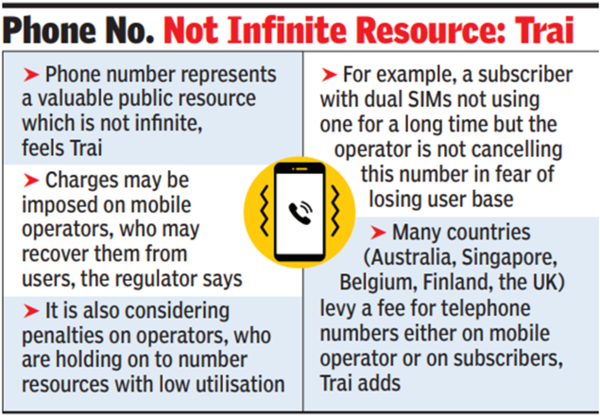Trai feels that phone number “represents an exceedingly valuable public resource which is not infinite” and charges may be imposed on mobile operators, who may subsequently recover them from users.
It is also considering whether to impose penalties on operators, who are holding on to number resources with low utilisation. For example, a subscriber with dual SIMs not using one for a long time but the operator is not cancelling this number in fear of losing user base.
“…Simply adhering to strict criteria for assigning numbering resources might not ensure judicious and efficient use of freely allotted numbering resources by service providers. One way of ensuring judicious and efficient use of any finite public resource is by imposing charges, while allocating it. Efficient utilisation can be further ensured by introducing penal provision for those holding numbering resources with low utilisation.”
Trai said just like spectrum, ownership of the numbering space resides with govt, which only grants mobile operators usage rights over the designated number resource during the tenure of licences. The new Telecom Law, which was passed in December last year, also has an enabling provision to charge for numbers, technically known as ‘telecom identifiers’.
To make a stronger case for fixing a charge on mobile operators, Trai cited several countries where a fee is levied for telephone numbers, either on the mobile operator or on subscribers. These include countries such as Australia, Singapore, Belgium, Finland, the UK, Lithuania, Greece, Hongkong, Bulgaria, Kuwait, Netherlands, Switzerland, Poland, Nigeria, South Africa, and Denmark.
Talking about the possible methods of charging, Trai said govt can look at either imposing a one-time charge per number, or seek an annual recurring charge for each numbering resource allocated to the service provider, or allocate numbering series, with govt conducting centralised auctions for the vanity numbers.
Trai, which has to submit recommendations to govt that will also cover the aspect of ever-shrinking numbering resources in the era of 5G, machine-to-machine communications and internet of things, is also taking a leaf out of the several auctions that mobile operators carry out for ‘vanity/fancy/premium numbers’.









































